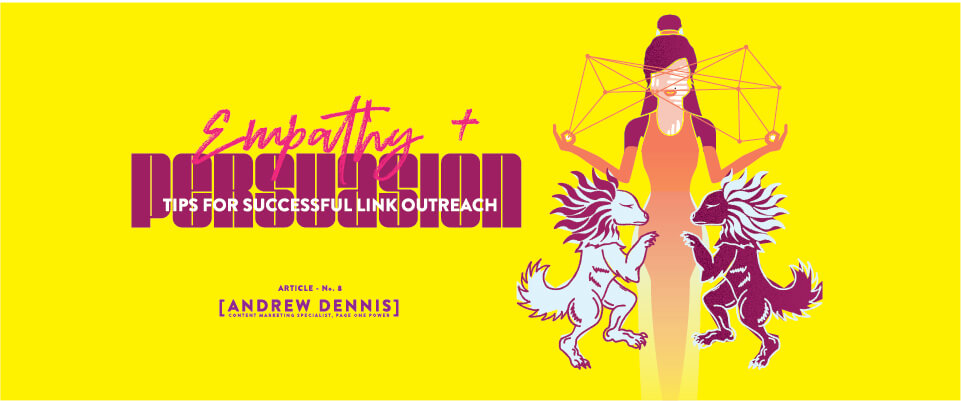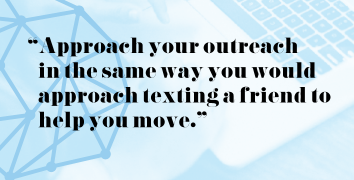
Link outreach is about two things: empathy and persuasion.
If you remember this simple fact, your outreach will be better than probably 80% of the outreach emails I receive daily. As the manager of our blog at Page One Power, I see A LOT of bad outreach and link requests, and the reason for this is because people don’t consider these two fundamental principles of link outreach.
But just because others are doing a bad job doesn’t mean you should settle for being average — in this article I want to explain the mindset you need (and a few helpful tips) to send quality outreach and give yourself the best chance to earn links and build meaningful relationships across the web.
You’re Emailing Humans…and Asking for a Favor
First and foremost, when sending outreach, keep the notion that you’re emailing other human beings at the forefront of your mind. This simple fact is the reason empathy is such a big part of successful link outreach.
Thinking about the human on the other side of your link request will force you to be human yourself. Ask yourself questions about that person…what is this person’s primary job or responsibility? Is this the right person to ask about a link? Why would they care about my page? Why would they link?
If you can’t answer these questions, you’re either contacting the wrong person or you have larger issues (as in: your page isn’t link-worthy). Finding the appropriate person for your link request is a crucial step to successfully securing your link, and it’s worth going the extra mile in terms of link prospecting to make sure you’ve found the absolute best way to connect. Don’t simply grab the first email you find on a website — really dig to find the person who is most likely to be responsible for adding links to the site. Sometimes this is a webmaster…editor…or even the person who owns the site — the point is that you need to review the site and research who you should be contacting.
The reason finding the right person is essential is because capturing someone’s attention and getting them to respond without your being passed off by multiple people is hard enough already. Furthermore, finding the most relevant person immediately demonstrates that you’ve taken the time to familiarize yourself with the prospective site, making your link outreach more compelling.

Along with being empathetic to the fact that you’re contacting a real, live (and busy) human, you also need to be cognizant of the fact that you’re essentially asking for a favor. Approach your outreach in the same way you would approach texting a friend to help you move. For example, a decent structure for your message would be:
- Short introduction with some personalization.
- Context for what you’re asking.
- Make the ask.
- Provide specific next steps/CTA.
- Thank them for their time.
In ideal situations, linking to your page benefits their audience, and thusly, their website. However, even in these circumstances, they are still doing you a favor and you need to be gracious and polite if you expect to earn a link.
If you simply remember that there is another person receiving your outreach email, and treat them like a person, you’re already halfway to sending better outreach than most. However, you still need to be persuasive if you want to elevate your link outreach and give yourself the best chance for success.
Decent Outreach Gets Responses, Compelling Outreach Gets Links
The difference between good outreach and great outreach is persuasion. And to be persuasive, you need to understand your reader and what compels them to act.
To understand the site owner you’re contacting, start by getting to know their audience and what interests them. What topics are most important to them? What types of content formats do they prefer? What other websites do they follow? What common challenges do they face? What types of sources do they trust?
Once you know the answers to these questions, leverage this information during your link pitch. Highlight the portion of your page that talks about the topic they care about most (or even go the extra mile and create an anchor link to that specific section). If their audience prefers video content, emphasize the video on your page. Identify how your page solves a problem for the target site’s audience and pitch your link within this context (this is the most powerful option).
To be persuasive, you need context, and to have context you need understanding. Research prospective websites thoroughly and you will have the knowledge necessary to make your outreach compelling.
Beyond audience research, there are some general best practices that you should follow. For example, clarity is key — you can’t persuade someone if they don’t know what you’re asking. Don’t beat around the bush or try to mask what your goal is. Be upfront and clear about the fact that you want them to link to your site. In fact, I’ve found it most effective to explain you’re submitting a resource for a link right within the subject line — just be sure to add some personalization, as well (the person’s name, the name of their site, how the resource appeals to their audience, etc.) so you don’t blend in with generic, low-grade link outreach.
On top of that, explicitly state where you think the link should point to and which page it should live on (with your supporting reasons from above). You want adding your link to be as easy as possible for this person. They shouldn’t have to hunt down a specific section of their page that might be relevant — all for your benefit.

Another aspect of message clarity is keeping your outreach email concise. Again, you’re emailing another human being with a job and responsibilities and they don’t have much time to spend reading your link pitch. Avoid muddying the waters by keeping your email short and to the point.
Link outreach represents the majority of link building work, and if you can’t outreach effectively, you’re not going to earn all the links you deserve. Fortunately, sending good outreach isn’t complicated as it requires only two things: empathy and persuasion. Be empathetic to the fact you’re contacting another person (typically a stranger) and asking them for a favor, and do your research to understand them and their audience so you can persuasively explain why they should link.
Now go out, send great outreach emails, and get the links your site needs.




